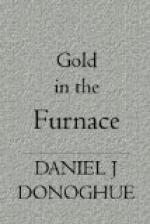He did not reduce his speed to take to the brush. The car beneath him flung clean off the ground as he swung to climb out of the grooves. It landed with all four wheels a-spin, but only struck on two. A sudden swerve, far out of the course, and the monster righted abruptly. Another sharp turn, and away it went again, crushing the brush and flinging up the sand in a track of its own that paralleled the road, but rougher though free from the ruts.
The brush was small, six inches high, but the wheels bounced over it madly. The whole car hurtled and bounded in a riot of motion. It dived, it plunged nose upward, it roared like a fiend—but it shot with cannon-ball velocity across the desert’s floor.
Five minutes later Bostwick’s car was almost fronting the team in the road, with its score of dusty mules. He dared not take the ruts at speed, and groaned as he slowed to climb the bank. He lost but little time, however, since once on the side he was going ahead again like mad; nevertheless, he cast a glance behind and saw that his gap had narrowed. Moreover, he would not attempt to return to the ruts as before, as a second of the teams was coming a mile or so away.
Like two pitching porpoises, discharging fiery wrath and skimming the gray of the desert sea, the two devices raced upon the brush. And nerve began to tell. Van was absolutely reckless; Searle was not. The former would have crowded on another notch of speed, but Bostwick feared, and shut off a trifle of his power. Even then he was rocking, quivering, careening onward like a star escaped from its course; and the gains Van made were slow.
The man on the second team paused to see them pass. In smoke and dust and with war’s own din they cleaved the startled air. And the man who saw the look that had set on Van’s hard-chiseled face was aware that unless his car should fail there was nothing on earth he could not catch.
Bostwick had begun to weaken. The pace over sage-brush, rocks, and basins of sand was racking both the car and the nerves that held the wheel. How long such a flight could be continued he dared not guess. Even steel has limitations. To what he was fleeing he could scarcely have told, since the telegraph would send its word throughout the desert-land, and overhaul him finally.
A sickening apprehension assailed him, however, within the minute. One of his cylinders was missing. His trained ear caught at the change of the “tune,” and he felt his speed decreasing. He glanced back briefly, where the dusty lump of steel, like a red-hot projectile, thundered in his wake.
He beheld a sudden fan-like flare of dust in the cloud Van was making. He even faintly heard the far report, and a grim joy sprang in his being.
Van had blown out a tire. Striking the high places, crowding on the speed, holding to a straight-away course like a merciless fate, the horseman heard an air cushion go, felt the lurch and lameness of the car, and steadied it back upon its road. He did not retreat by so much as a hair the lever advancing his spark. He did not budge the gas control, but left it still wide open. If all of his tires should blow out together he would not halt his pace. He would drive that car to destruction, or to triumph in the race.




